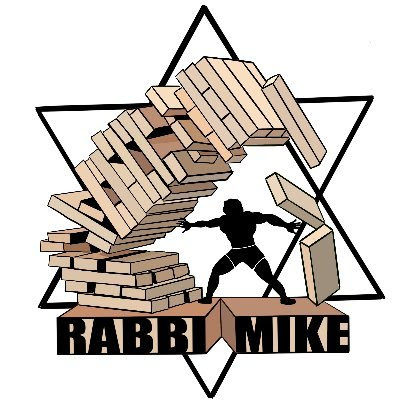Answers, Questions, Music: Why, Abq Jew hears you, his loyal readers, ask, does Xmas have twelve days - while Xanuqa, the earlier and clearly more important holiday, have only eight?
Surely you, his loyal readers, will recall that Abq Jew answered that question in his inimitable December 2019 post A Petri Dishes the Twelve Days.
More about Alexandra Petri - and more music - to follow. But first, Abq Jew wishes to bring to your attention the life, the thought processes, and the work of Rabbi Mike Harvey.
The Life. Rabbi Mike's website tells us:
Michael E. Harvey is the Amazon bestselling author of Let’s Talk: A Rabbi Speaks to Christians. An ordained rabbi, he has led congregations and served as a hospital chaplain. Rabbi Mike is passionate about social justice, interfaith cooperation, and bringing deep Jewish learning to the lay public.
He has followed these passions in serving his community, including founding and directing the Interfaith Council of the Caribbean as well as directing the Interfaith Leaders of Greater Lafayette. He also serves on the rabbinic advisory council of the American Jewish Archives.
When he isn’t writing, Rabbi Mike can be found building community and offering a listening ear in a different kind of congregation: as a bartender in Indiana.
Well, even though Twitter is becoming a dumpster fire, I will continue to teach as long as I can until it is simply not worth it anymore. So with that, I'd like to do a #thread about the differences between Jewish and Christian thought processes and the ramifications. #threads
One of the greatest challenges I face in Jewish-Christian relations is the challenge Christians face in trying to understand Jewish thought processes and interpretations. They attempt to see Judaism through a Christian lens which, inevitably, fails. It's important to see why./1
Often I teach the phrase, "Judaism is about deed, not creed." Christianity has creeds. You believe this. You pledge that. This is the answer. That's it. Judaism does not. Any question to a learned Jewish person is inevitably answered with, "yes but..." meaning there.../2
...is a staunch complexity behind the answer. That is because Judaism cherishes the questions. The answers are, "well this rabbi said this, but this rabbi said that." or "The Torah said this, but some rabbis think this, and some think that..." etc. It is the nuance, yes.../3
...the nuance that gives meaning. It is why Jews have (or had, until Christians had their way) the largest libraries in the world. It is why we have the idiom "2 Jews, 3 opinions." The conversation, the study, the argument, the source material and interpretation, this is.../4
...what gives Judaism its beauty, its meaning. And, not to be too direct, it matches how the human mind processes ideas, with what is known as critical thinking. I shudder at Jews who say "this is what Judaism says." Judaism has never said one thing. And it doesn't now. /5
Learned Jews understand that yes there are majority opinions that have become put in place, but we retain the minority opinions because they may one day become relevant again. Times change, people change, the world changes, and the answers from long ago do not always work. /6
This is why Judaism continues to evolve and change, whether from Torah and Biblical thought, to cultic Temple rituals, to rabbinic and oral law, to halacha, agadah, commentary etc. Jewish study is to be done in "hevruta" at least with two people. Why? Because your thoughts.../7
...alone are simply not enough. In order to think critically, you need another mind, at least one other mind, to help you challenge yourself, the text, the interpretation. Now, how is this different from Christianity? I do not mean to generalize, but having studied Christian /8
...history, thought, and canon, what jumps out is simple creeds of faith. This is what it means. This is what we belief. End of story. This has troubling ramifications internally and externally, the least of which is a failure to understand Judaism. What are some internal /9
...ramifications of creed, and short simplistic answers of faith? Well, for one, if you question something you are not praised, as you would be in Judaism. In Judaism, the question is what gives meaning. Christian creed and canon leaves little room for questions. Instead../10
...if you question, you are seen as someone diverting from the flock. Your faith must be weak. Something must be wrong with you. This is your fault. There are elements of shame, guilt, and toxicity that inevitably follow this mindset. Examples include ideas about.../11
...sexuality, purity, and the like. More simply put, when Christians want people to have "decorum" what they mean is they want "obedience." Obedience to faith is simply not a natural understanding in the human mind. Faith does not stand on a one sentence declaration. /12
Faith is complex, and it sits on a tower of sand. This leads to the external problems. Why did Christians (and still to this day) burn Jewish libraries, outside sources, and attempt to shelter their flock from the outside world? It is because the "faith" is not strong.../13
...enough to take criticism, nuance, and conflicting information. Christianity has for millennia relied up on "might is right," meaning that the faith is strong because so many people have it. I have been told this on multiple occasions in my discussions. "How can 3 billion/14
...people be wrong about something?" Well, if Christians were taught HOW their answers were crafted, they would understand. Most are taught simply, "this is what we believe" or "this is what Jesus said,"when really it was much later, perhaps a church father or a later writing/15
...that came from someone with a differing agenda, and it has now become canon, now become part of the creed. This brings fear and toxicity to the outside world, thus leading to the motivation to not only burn books and libraries, but to engage in genocide of "non-believers"/16
This is compounded by threats of eternal damnation, that if you break the "faith" or question it, not only is something wrong with you, but an eternity of torment awaits you. Think about what this does to the human psyche. Think about how one must shape their world to feel /17
...that this is an acceptable way to live. Then think of the trauma brought to so many Christians who express critical thinking towards the "faith." Think about those who ostracize their own children for being LGBTQ+ or atheists, those who are told they are wrong for thinking/18
..different thoughts. Think about the abusive words Christians have heard inside churches, that all blame is on you, you are worthless, a sinner, and only Jesus can save you from yourself, and if you don't fully give yourself to the creed, you will be nothing in the eyes/19
of a God that would happily send you into the arms of demons and the devil for eternity to suffer. Now, think about why the antisemitic tropes exist about Jews "controlling the world." Why are there so many Jewish Nobel Prize winners? Christians are quick to say it must /20
...be rigged! It does not occur to them that Jews are built to be critical thinkers. To be creative. To ask questions, and find different ways to think about the world. Why are Jews so successful despite Christian laws in place to restrict them for 2,000 years? Because Jews/21
and all of Judaism teaches that we should find ways around things, think creatively, find success elsewhere and in different ways. The arrogance of the creed of Christianity leads to confusion and jealousy. A Christian thinks, "why am I not as successful? I do as I'm told." /22
It never occurs to them that it is the creed itself, the restrictions of "faith" that keeps them from their own success, that teaches them to obey rather than to find new creative ways to think and work. For a Christian, one must "break out" of the restrictions, whereas for.../23
...Jews, it is a natural occurrence. Again, I speak of Christian canon and faith, and am generalizing. But if Christians truly wish to engage in talks with Jews, they must let go of the Christian ideals of obedience and creed, and enter our world of nuance. Come and learn. /END
The Work. It will come as no surprise to you, Abq Jew's loyal readers, that Rabbi Mike has written a book. Which Abq Jew has not read yet nevertheless recommends. Available on Amazon as Kindle and "wherever books are sold," one imagines, in paperback.
Not sure what to get a loved one for Hanukkah or Christmas?
“Let’s Talk” makes an excellent addition to “book night” and fits in a stocking!
Start your new year off with being a better ally!
In the meantime ...
Alexandra Petri has provided us, once again, her ranking of 100 - yes, 100 - Christmas songs.
You may recall that Ms Petri's ranking was first published in December 2018; and then updated in November 2021.
Whereupon she wrote:
If you are on the Internet long enough, there comes a year when you will be forced to rank something. Now it is my time.
So I am taking the liberty of going through the 100 holiday songs being foisted upon us everywhere and ranking them from Most Especially Heinous to Best.
This is probably a good idea, and I feel fit and confident! I bet this will be an easy, pleasant process. I’m amazed I haven’t already compiled several lists just like this!
Number 100 on Ms Petri's list - the worst holiday song of all - is (no surprise) Little Drummer Boy. Of which Ms Petri says:
My hatred for this song is well-documented. I think it is because the song takes approximately 18 years to sing and does not rhyme. The concept of the song is bad. The execution of the song is bad.
There is not even an actual drum in the dang song, there is just someone saying PA-RUM-PA-PUM-PUM, which, frankly, is not a good onomatopoeia and probably is an insult to those fluent in Drum. I cannot stand it.
Nothing will fix it, even the application of David Bowie to it. Every year I say, “I hate this song,” and every year people say, “Have you heard David Bowie’s version?” Yes. Yes, I have. It is still an abomination.
Number 97 on Ms Petri's list - and this is a surprise - turns out to be Rudolph the Red-Nosed Reindeer. Created (see December 2011's Yiddish Rudolph) by Robert Lewis May - a Yid, of course. Song by John David Marks - also a MOT. About which Ms Petri says:
One of my chatters correctly describes this as a song about how differently abled people are bullied until the system finds a way to exploit them for profit.
The only good thing about this song is that Rudolph is a reindeer with a people name, and all the other reindeer have dog names. Prancer, Blitzen, Dancer!









No comments:
Post a Comment